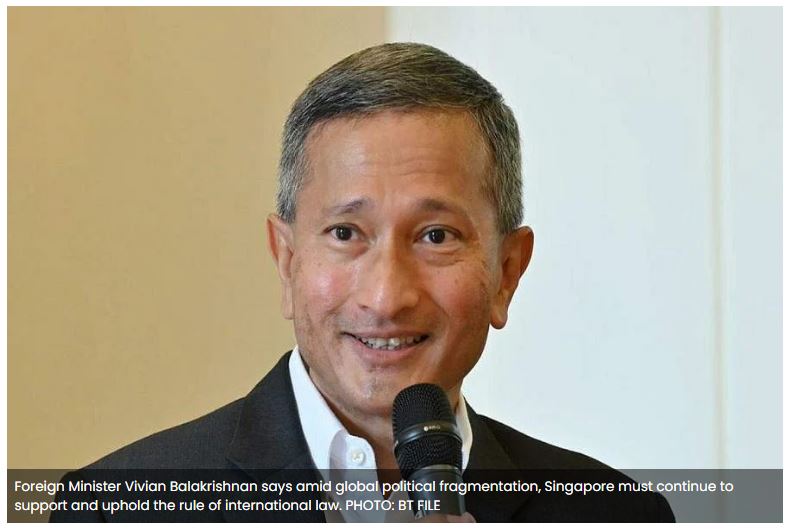Singapore’s key foreign policy priorities and principles for 2023
SINGAPORE is one of the few countries whose unity has strengthened through the Covid-19 pandemic, giving it a good platform to navigate its foreign policy challenges amid a “perfect storm of multiple interlocking crises”.
Interest from businesses, investors, and entrepreneurs in coming to Singapore remains, as they recognise and appreciate its stability and consistency, said Foreign Minister Vivian Balakrishnan on Monday (Feb 27) in a speech to Parliament outlining Singapore’s foreign policy priorities and principles for the coming year.
He added: “We refuse to be a vassal state that can be bullied or bought. We will not be a proxy or stalking horse for any superpower. We will uphold principles but not choose sides.”
Malaysia, Indonesia, Brunei
Responding to questions from Members of Parliament (MPs) such as Vikram Nair (Sembawang GRC) on Singapore’s plans for its relationship with Indonesia, Dr Balakrishnan said agreements that will bring tangible benefits are well underway.
Touching on three major bilateral agreements – the Flight Information Region agreement, Defence Cooperation Agreement, and the Extradition Treaty – Dr Balakrishnan said: “Taken together, the resolution of these three longstanding issues paves the way for us to advance our bilateral cooperation significantly in the years ahead.”
He added that Singapore looks forward to welcoming Indonesia President Joko Widodo to Singapore soon for the next Singapore-Indonesia Leaders’ Retreat.
Turning to Malaysia, which MPs Don Wee (Chua Chu Kang GRC) and Sylvia Lim (Aljunied GRC) spoke on, Dr Balakrishnan said Singapore’s relationship with Malaysia is underpinned by strong people-to-people ties and frequent high-level exchanges.
During Malaysian Prime Minister Anwar Ibrahim’s introductory visit to Singapore in January, three government-to-government agreements were inked, signalling the countries’ commitment to work on new and emerging areas of mutual interest.
In a separate speech, Second Minister for Foreign Affairs Maliki Osman noted that President Halimah Yacob will make a state visit to Malaysia in March.
As Singapore seeks to deepen relations with Malaysian states, Dr Maliki will also be visiting Terengganu and Kelantan in April to explore opportunities to work together for mutual benefit.
Dr Balakrishnan said that, as with any friendship, problems will arise from time to time.
For example, while the issue of sovereignty over Pedra Branca has been conclusively settled, Malaysia has raised objections to Singapore’s development works at Pedra Branca.
These works are needed to enhance maritime safety and security and to improve search and rescue capabilities in the area, he said. They also ensure that Pedra Branca is adequately protected against the threat of sea-level rise.
“Let me assure you that these development works are fully in accordance with international law and Singapore’s sovereignty over the island and its waters,” added the minister.
Nevertheless, in the spirit of mutual cooperation and good faith, Singapore temporarily suspended the works in May 2022. In December, Singapore put forward proposals to Malaysia to resolve the issue and to move forward with the work.
He said: “We will manage our differences constructively and pragmatically and not allow any single issue to overshadow the entire relationship.”
On Brunei, he said Singapore looks forward to expanding cooperation in emerging areas such as the green economy, agri-tech and energy.
Asean
Singapore will support Indonesia’s goals to step up Asean integration in areas like the green economy and digital integration, said Dr Balakrishnan, and has committed to helping Timor-Leste become part of the association.
The need for consensus within Asean is a feature, not a bug because of the great diversity within it, he said. Nevertheless, the Asean Charter does provide for decision-making at the Leaders’ level, even if there are “profound political problems” in a member state.
“For example, we have not allowed the coup in Myanmar to paralyse Asean or hold the rest of us hostage.”
He added that Singapore and Asean remain deeply disappointed with the lack of progress in Myanmar two years following a coup in the country, which has resulted in widespread violence.
He said: “We will not interfere with domestic politics in Myanmar. But the solution must ultimately involve national reconciliation amongst all the domestic stakeholders. This will not be easy to achieve.”
US-China
Touching on the incident in early February when the US shot down what it claimed to be a spy balloon from China, Dr Balakrishnan said both sides need to establish guardrails, as hardened, negative views against the “other” increasingly become structural features of geopolitical discourse in both the US and China.
He said: “There is a growing body of opinion within China that the US is a superpower in terminal decline, which is determined to contain China’s rise at all costs.
“In the US, there has also been a deep shift in attitudes towards China. The US believes that China is the only competitor with both the intent to reshape the international order and, increasingly, the economic, diplomatic, military, and technological power to advance that objective.”
Turning to heightened US-China tensions over the issue of Taiwanese independence, Dr Balakrishnan said a conflict over Taiwan will have global repercussions, and a much more direct impact on Singapore than the ongoing war in Ukraine.
He said Singapore does not want to be forced to choose sides, adding: “We have always put Singapore’s national interest first and we take principled positions impartially, even if it does not always please one or the other superpower. We need the quiet confidence and national unity to do so consistently for the long term.”
Amid global political fragmentation, Singapore must continue to support and uphold the rule of international law, he said, citing Russia’s invasion of Ukraine as a violation of international norms.
He added: “We are entering a period of intense superpower rivalry, global economic disruption, and looming climate change – and all this within a more fragmented, turbulent world…
“Singapore and Singaporeans must approach these challenges with a combination of realism and quiet confidence.” THE STRAITS TIMES


 Thailand
Thailand




